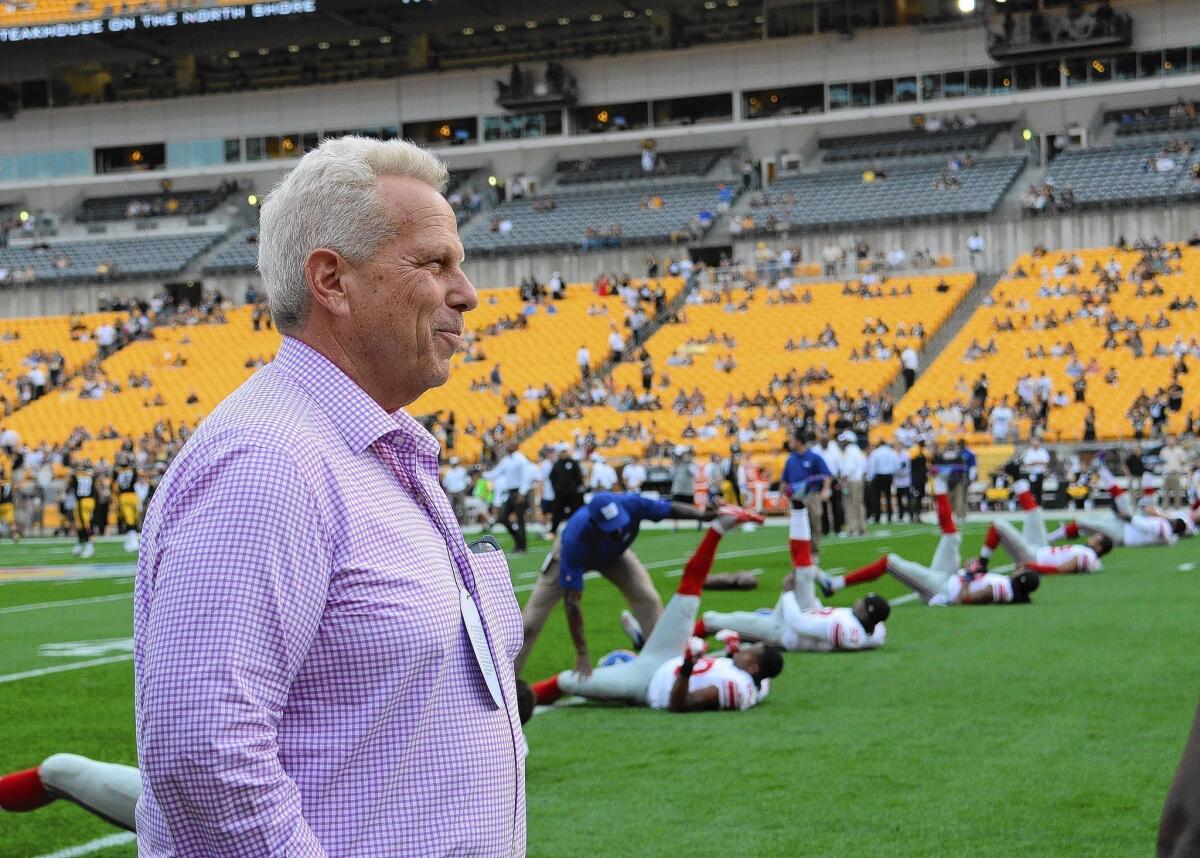Private donors commit $65 million to studying youth concussions

- Share via
With the focus on concussions in young athletes intensifying across the nation, the White House on Wednesday unveiled a raft of initiatives aimed at preventing mild traumatic brain injury and improving its diagnosis and treatment in children.
Readying for a White House event Thursday focusing on youth sports and brain safety, officials announced a fresh commitment of $65 million in private funds to boost clinical and scientific work.
In addition to $30 million from the NCAA and a new pledge of $25 million from the NFL for separate endeavors, a $10-million gift to UCLA from Hollywood executive and New York Giants co-owner Steve Tisch will help get a national tracking system for concussions off the ground.
“Hopefully, 20 years from today, athletes won’t be discovering the head injuries that football players now are discovering they may have gotten when they were playing in high school and college,” said Tisch, whose son plays high school football and whose daughter plays lacrosse. “This is kind of a new frontier.”
Tisch’s donation will sustain and expand a university program that since 2012 has treated 600 young patients with brain injuries and studied the after-effects of concussions in middle school, high school and college athletes.
“This commitment will launch our program to the next level,” said Dr. Christopher Giza, a pediatric neurologist and director of the newly named UCLA Steve Tisch BrainSport Program. In the coming years, Giza said, the program hopes to broaden its reach into schools and youth sports leagues across the region; fuel advances in diagnosis, care and recovery; and clarify the longer-term effects of concussion on the still-developing brain.
In a briefing Wednesday, White House spokesman Jay Carney said reports that concussions may set the stage for learning problems, mental health issues and even dementia have made parents wary of allowing their children to participate in organized athletics.
In late 2013, President Obama reflected that growing concern, saying that if he had a son, he would not let him play pro football. But given the Obamas’ interest in sports and the first lady’s campaign to boost physical activity among the nation’s children, Carney said, the president has been eager to raise awareness and boost research on something that “really is a topic of conversation across the country.”
A report last fall by the National Academy of Sciences’ Institute of Medicine found significant gaps in what is known about the effects of repeated blows to the developing brain.
The panel recommended that, until more is known, leagues, coaches and parents should take several precautions: A child who has been hit hard in the head should be banned from playing until he or she has been medically evaluated. And game rules regulating safety should be strictly enforced. Those, for instance, penalize head-to-head contact in football and blindside hits to the head in hockey and lacrosse.
Some researchers suggest that the young brain may be more resilient to bumps and injuries and may rebound more quickly than that of an older athlete. Others fear that — because the young brain is still under construction and much of its wiring has yet to develop a protective, fatty coating — repetitive blows may be more damaging.
According to the latest available figures, about 250,000 people under the age of 19 were treated for concussions in 2009, up from 150,000 in 2001. And an NCAA survey of 15 college sports recently showed that between the 1988-89 and 2003-04 academic years, the overall rate of reported concussions doubled, from 1.7 to 3.4 per 1,000 “athletic exposures.”
Among the public-private partnerships to be announced Thursday:
—The NCAA and the Department of Defense will launch a $30-million effort to fund the most comprehensive research to date on concussions and head impacts short of concussion. The collaborative effort will include an “educational grand challenge” aimed at improving safety behaviors and changing a culture — in college sports or in the military — in which blows to the head are seen as dings to be “shaken off.”
—The NFL will commit $25 million over the next three years to support projects aimed at promoting youth sports safety. The league says it will launch pilot programs to expand access to athletic trainers in schools, in conjunction with the National Athletic Trainers’ Assn. Under a program called “Back to Sports,” the NFL also will collaborate with the National PTA and the American Heart Assn./American Stroke Assn. to educate parents about sports safety and the value of athletic participation and an active lifestyle.
—The National Institutes of Health will launch a long-term study to detect, measure and track the lingering effects of repetitive blows to the head.
—The National Institute of Standards and Technology will invest $5 million over five years to develop advanced materials to better protect athletes, military personnel and others against concussion.
Twitter: LATMelissaHealy
More to Read
Sign up for Essential California
The most important California stories and recommendations in your inbox every morning.
You may occasionally receive promotional content from the Los Angeles Times.













